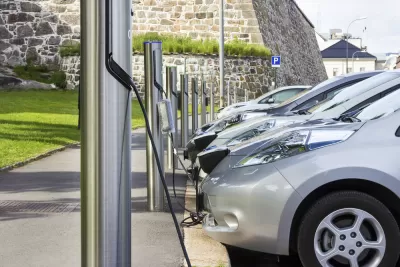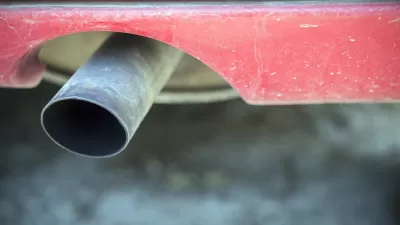According to a new report by the California Air Resources Board, even if electric vehicle sales were to increase tenfold, it would not reduce emissions from transportation enough to meet a 2030 climate goal. A major reduction in driving is needed.

The California Air Resources Board (CARB) announced in July that the state had achieved the steep carbon emissions reductions that were set in a landmark 2006 law – emissions had been reduced in 2016 to 1990 levels. However, there was also ominous news in the release of the 2016 greenhouse gas inventory. For the second consectuive year, transportation emissions had increased, accounting for 41 percent of all emissions.
That law, Assembly Bill 32, expires in 2020, and its replacement, Senate Bill 32, sets the bar much higher: reduction of greenhouse gases 40% below 1990 levels by 2030.
In order to meet that goal, "a major turnaround in the transportation sector" is required, according to a new report by CARB released Monday, reports Liam Dillon for the Los Angeles Times on Nov. 26.
Dramatically increasing the amount of electric vehicles on the road will not solve the problem, the report said. Even if new car sales of zero-emission vehicles increase nearly tenfold from today, the state would still need to reduce vehicle miles traveled per capita by 25% to meet the 2030 goal.
“California will not achieve the necessary greenhouse gas emissions reductions to meet mandates for 2030 and beyond without significant changes to how communities and transportation systems are planned, funded and built,” the report said.
The report, prepared for the legislature, is to discuss progress toward meeting the goals of the Sustainable Communities and Climate Protection Act of 2008 (SB 375), viewed as a landmark smart growth bill at the time. The law also "required regions across the state to plan for housing growth so that people could live closer to where they work or public transit and reduce their time on the state’s roadways," adds Dillon.
“If we are going to meet California’s bold climate goals, we must hold ourselves accountable,” said State Senator Ben Allen (D – Santa Monica), who authored the law (SB 150) requiring the report, writes Ella Wise for ClimatePlan.
“To do that effectively we need to understand our progress through active monitoring and real-time data and be ready to make the changes needed to get us on target,” adds Allen.
The legislation requires the report to include a discussion of best practices and challenges faced by the state's 18 metropolitan planning organizations (MPOs} in meeting their respective transportation emission-reduction targets approved by CARB.
Related in Planetizen:
-
Report: Transportation Emissions Sully California's Environmental Reputation, September 6, 2018
- California's Great Transportation Divide—Between Two Key Governmental Agencies, July 9, 2018
Hat tip to Darrell Clarke.
FULL STORY: California falling short on climate change goals because driving is increasing, report finds

Maui's Vacation Rental Debate Turns Ugly
Verbal attacks, misinformation campaigns and fistfights plague a high-stakes debate to convert thousands of vacation rentals into long-term housing.

Planetizen Federal Action Tracker
A weekly monitor of how Trump’s orders and actions are impacting planners and planning in America.

San Francisco Suspends Traffic Calming Amidst Record Deaths
Citing “a challenging fiscal landscape,” the city will cease the program on the heels of 42 traffic deaths, including 24 pedestrians.

Adaptive Reuse Will Create Housing in a Suburban Texas Strip Mall
A developer is reimagining a strip mall property as a mixed-use complex with housing and retail.

Study: Anti-Homelessness Laws Don’t Work
Research shows that punitive measures that criminalized unhoused people don’t help reduce homelessness.

In U.S., Urban Gondolas Face Uphill Battle
Cities in Latin America and Europe have embraced aerial transitways — AKA gondolas — as sustainable, convenient urban transport, especially in tricky geographies. American cities have yet to catch up.
Urban Design for Planners 1: Software Tools
This six-course series explores essential urban design concepts using open source software and equips planners with the tools they need to participate fully in the urban design process.
Planning for Universal Design
Learn the tools for implementing Universal Design in planning regulations.
Heyer Gruel & Associates PA
JM Goldson LLC
Custer County Colorado
City of Camden Redevelopment Agency
City of Astoria
Transportation Research & Education Center (TREC) at Portland State University
Jefferson Parish Government
Camden Redevelopment Agency
City of Claremont





























